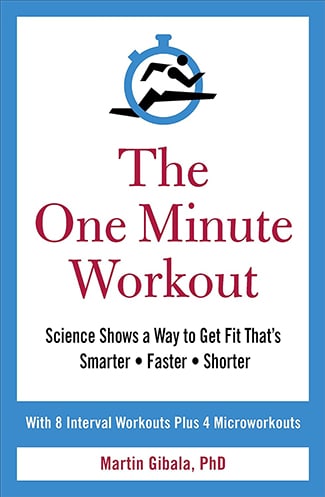You've probably heard of HIIT — high intensity interval training. In fact, you may feel so familiar with the idea that you think you understand it. But do you? People often hold some popular misconceptions about HIIT, and today we'll unpack what some of those are with Dr. Martin Gibala, a foremost researcher of this fitness modality and the author of The One-Minute Workout: Science Shows a Way to Get Fit That's Smarter, Faster, Shorter. Martin explains the main, underappreciated advantage of HIIT, which revolves around the "intensity-duration trade-off": the higher intensity you make exercise, the shorter your workouts can be while still triggering improvements in metabolism, cardiovascular health, and mitochondrial capacity. We get into the fact that the intensity of HIIT needn't be as high as you might think and that, contrary to popular belief, sprinting at intervals is actually a predominantly aerobic rather than anaerobic workout. Martin answers questions like whether Zone 2 cardio has an advantage over HIIT, if the so-called "afterburn effect" of HIIT is real, if you can do HIIT if you're older or have heart problems, and whether you should worry about the way HIIT can raise cortisol in the body. He also shares specific HIIT workouts you can do, including a walking interval workout and one of the best higher-intensity protocols to try.
You've probably heard of HIIT — high intensity interval training. In fact, you may feel so familiar with the idea that you think you understand it. But do you?
People often hold some popular misconceptions about HIIT, and today we'll unpack what some of those are with Dr. Martin Gibala, a foremost researcher of this fitness modality and the author of The One-Minute Workout: Science Shows a Way to Get Fit That's Smarter, Faster, Shorter. Martin explains the main, underappreciated advantage of HIIT, which revolves around the "intensity-duration trade-off": the higher intensity you make exercise, the shorter your workouts can be while still triggering improvements in metabolism, cardiovascular health, and mitochondrial capacity. We get into the fact that the intensity of HIIT needn't be as high as you might think and that, contrary to popular belief, sprinting at intervals is actually a predominantly aerobic rather than anaerobic workout. Martin answers questions like whether Zone 2 cardio has an advantage over HIIT, if the so-called "afterburn effect" of HIIT is real, if you can do HIIT if you're older or have heart problems, and whether you should worry about the way HIIT can raise cortisol in the body. He also shares specific HIIT workouts you can do, including a walking interval workout and one of the best higher-intensity protocols to try.
